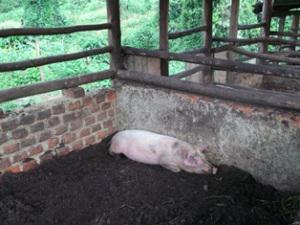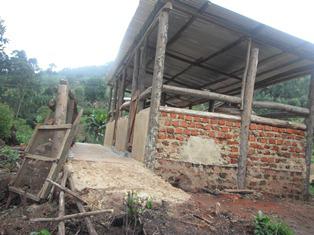Tusingwire John Bosco
Other projects
The project aims to expand the existing piggery and also use as a tool to fight root causes of key threats affecting the biodiversity of Bwindi Impenetrable National park (BINP).

Pig in new pen
Community Initiatives for Biodiversity Conservation (CIBC) started a community piggery project to provide an alternative source of meat to community members accustomed to hunting in the forest before it was designated as a national park to protect the endangered Mountain Gorillas. Creation of the Bwindi national park created a displacement that was not accompanied by either organized resettlement or compensation and thus resulted in displacement to the limited land immediately adjacent to the Park. These settlements evolved into communities characterized by malnutrition, poverty, hunger and low levels of education. Being in the remote rural area, the major source of livelihood is conventional agriculture. Improving farming practices through educating and empowering farmers with demonstration projects is intended to improve community livelihoods and reduce habitat loss, poaching and diseases. Habitat loss, poaching and diseases are the main threats to the biodiversity of BINP and factors causing this are mainly related to human activities and the need for survival. Hunger and poverty are main factors due to underdeveloped agricultural and animal husbandry projects and markets.

Current organic piggery structure with solar tranparent roofing to allow natural drying of the pen
During the implementation of this project activities such as training of farmers better piggery husbandry practices, breeding pigs and providing support to farmer groups with at least boar and a saw, then empowering the farmers to own their pigs and distributing the fallowed piglets amongst themselves will in the few years allow every member of the group own at a pig pair. These pigs upon multiplication and maturity will be many, this will attract CIBC to open a quality public pork joint in the open market. The farmers who will be selling their pigs to CIBC will be getting their cash immediately, eat pork and such income will help to provide an income to reduce on poverty, hunger and malnutrition. When poverty is no more, threats such as encroachment, poaching and disease on the protected area’s biodiversity will reduce.
At the project demonstration centre, gorilla conservation awareness activities for all farmers will emphasize the role of the piggery as an alternative source of bush meat. Associated benefits such as income generation at individual and household level and the community will be shown as well. Farmers will also be shown organic piggery practices utilizing organic waste to feed pigs and use of waste from pigs to enrich the fertility of the soil for increased crop yields.